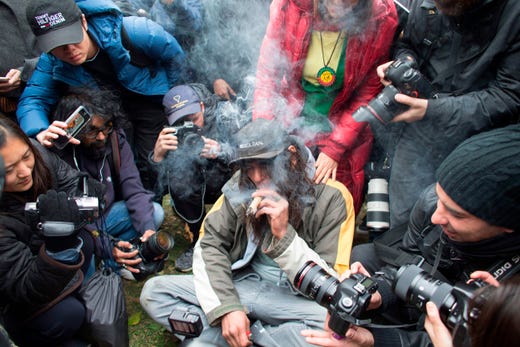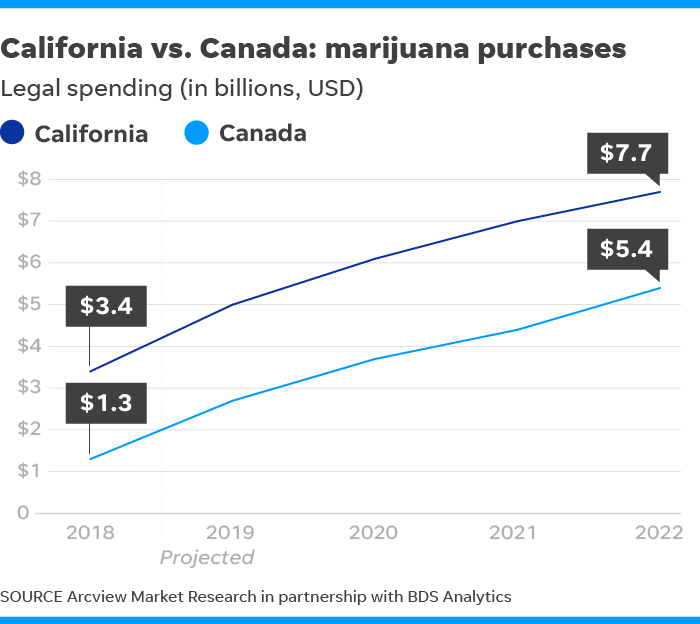Comment;
This will be an interesting experiment. I’ll admit to being somewhat biased in my expectation for a less than favorable long-term outcome however…
Trevor Hughes, USA TODAYPublished 6:18 a.m. ET Oct. 16, 2018 | Updated 8:44 p.m. ET Oct. 16, 2018
Canada becomes the most recent country to legalize marijuana. Advocates hope the legislative launch spreads globally. USA TODAY
(Photo: LARS HAGBERG, AFP/Getty Images)CONNECTTWEETLINKEDINCOMMENTEMAILMORE
VANCOUVER – Canada’s launch of legal marijuana sales may set the stage for a global cannabis revolution, unleashing a wave of high-quality medical research that could bolster pot’s reputation as a healthier alternative to alcohol and tobacco and fuel a economic boom across the USA.
Starting Wednesday, Canada becomes the highest-profile country to not only decriminalize cannabis possession and use, but to tax, regulate and monitor its growth, distribution and sale.
“They know they are the global leaders if they get it right. And they are making this a priority from the top down,” said April Pride of Van der Pop, a Seattle-based women-focused cannabis lifestyle brand operating in the USA and Canada.
Canada’s national approach means pot businesses can use banks, trade stocks and sponsor peer-reviewed medical studies like any other pharmaceutical operation. It’s a far cry from the piecemeal approach taken in the USA, where cannabis entrepreneurs worry the Justice Department may swoop in if the political winds shift. Though a majority of states have adopted some form of legal weed, marijuana remains illegal at the federal level in the USA.
“Canada fully legalizing marijuana for adult use is a historic moment that the whole world should celebrate,” said Daniel Yi, a spokesman for California-based marijuana company MedMen, which has operations in the USA and Canada.
American-based cannabis firms welcome Canadian legalization, in part because it’s a new market for them and in part because it could provide further support for legalization efforts in the USA and across the globe.
Supplies are likely to be scarce at first, largely because the country’s provinces haven’t finished the permitting process for privately owned stores. This week will see only a relative handful of stores open across Canada, and many of those will be government-run.FacebookTwitterGoogle+LinkedInPot eh! Canada to legalize marijuana Fullscreen

A man smokes a marijuana cigarette during a legalization party at Trinity Bellwoods Park in Toronto, Ontario, Oct. 17, 2018. Nearly a century of marijuana prohibition came to an end Wednesday as Canada became the first major Western nation to legalize and regulate its sale and recreational use. Scores of customers braved the cold for hours outside Tweed, a pot boutique in St John’s, Newfoundland that opened briefly at midnight, to buy their first grams of legal cannabis.In total, Statistics Canada says 5.4 million Canadians will buy cannabis from legal dispensaries in 2018, about 15 percent of the population. Around 4.9 million already smoke. Geoff Robins, AFP/Getty ImagesFullscreen
Next Slide29 PhotosPot eh! Canada to legalize marijuana
Users will be allowed to buy online and have products shipped to their homes, a recognition of how spread out Canada’s approximately 37 million residents are. For comparison, California has about 39 million residents living in a state 25 times smaller than Canada.
Advocates said Canada’s measured approach to legalization is designed to head off concerns about “reefer madness” and prove that a modern nation can permit widespread pot use. Canada’s marijuana marketplace is expected to ultimately be worth $6.5 billion in annual sales, Yi said. California, by comparison, could be worth $11 billion, he said.
Though Canada’s market will probably end up smaller than California’s, it’s an important symbol of success to marijuana enthusiasts who said governments are finally acknowledging the devastating effects of the war on drugs. Uruguay is the only other country that has legalized marijuana, and Canada’s status as a member of the powerful Group of 7 economic alliance, which includes the USA, France and Japan, gives its legalization added emphasis.
“The big difference – and it is a critical difference – is the blessing provincial governments have received from their federal government,” said Steve Hawkins, executive director of the Marijuana Policy Project, one of the biggest pro-legalization groups in the USA. “Hopefully, Congress will take notice quickly, and that competitive American spirit will kick in sooner rather than later.”
In a sign of the interest, international alcohol and tobacco companies are investigating or partnering with Canadian cannabis companies, including Molson Coors and Marlboro maker Altria. Those moves reflect a more traditional way of thinking, that marijuana use is primary for after-work or social relaxation, said Marc Lustig, chairman and CEO of the cross-border CannaRoyalty, a publicly traded marijuana company. He said there’s a potentially much larger market for cannabis as a medical product.
In the USA, legalization critics said marijuana enthusiasts should wait for evidence-based research before relaxing cannabis prohibition. That’s created a Catch-22 situation in which American researchers are tightly limited in how they can investigate marijuana because it’s illegal.
“If it turns out that true research done by qualified clinicians proves that cannabis can treat anxiety better than Xanax or relieves pain better than Advil, think about the implications of that,” Lustig said. “People have largely focused on this being as a recreational product, (but) that’s where this market could go haywire and just blow the top off of this being seen as just an alcohol or tobacco replacement product.”
Critics said that’s precisely the problem with the kind of marijuana legalization Canada is unveiling: It’s a market, with large corporations rushing to commercialize, capitalize and encourage users’ habits.
The U.S.-based anti-legalization group Smart Approaches to Marijuana will launch an effort Wednesday to track any negative impacts of legalization in Canada. The group pointed out that legalizing pot puts the country at odds with international drug control treaties and risks creating another Big Tobacco industry.
SAM’s executive director, Kevin Sabet, said he’s confident Canadians will reconsider once they understand how legalization can increase dangers from drugged driving, youth use and overall increased consumption of an intoxicant. The group instead supports decreased criminal prosecution, along with improved drug-treatment options for heavy users.
“As more Canadians feel the negative effects – secondhand smoke, workplace accidents, car crashes, declining school performance, loss of productivity and other issues – I am confident the policy will be reversed in time,” Sabet said.
Those concerns are nothing new for Canada’s marijuana enthusiasts who said it’s about time governments bowed to the reality of widespread marijuana use and the demand for alternatives to alcohol and opiates. To help head off concerns, marijuana-infused foods known as edibles, which have accidentally poisoned children across the USA, will remain temporarily banned while Canadian researchers examine their effects.
Though excitement is building toward Wednesday’s start of legal sales, in true Canadian fashion, people are simultaneously tempering expectations.
“As much excitement as there is for my mother to smoke her first joint, the marketplace will not be an experience that matches the excitement level,” Lustig said. “It will take months to roll out.”

- COVID UPDATE: What is the truth? - 2022-11-08
- Pathologist Speaks Out About COVID Jab Effects - 2022-07-04
- A Massive Spike in Disability is Most Likely Due to a Wave of Vaccine Injuries - 2022-06-30

